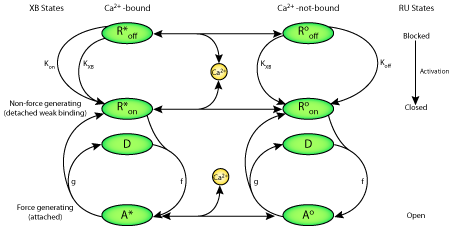Campbell, Chandra, 2006
Model Status
This model runs in PCEnv and COR, but does not recreate the published results. The units are continuous throughout, but since most of the model parameters were not defined in the paper, they were set to 1, which does not generate correct results. All the equations are correct, either taken from the paper or referenced papers (and are listed as such). The model authors have been contacted.
Model Structure
ABSTRACT: Stretch activation is an intrinsic length-sensing mechanism that allows muscle to function with an autonomous regulation that reduces reliance on extrinsic regulatory systems. This autonomous regulation is most dramatic in asynchronous insect flight muscle and gives rise to wing beat frequencies that exceed the frequency capacity of neural motor control systems. Stretch activation in insect flight muscle allows the contractile features of the flight muscle to be matched and tuned to the wing-thorax-aerodynamic load to ensure proper muscle contraction frequency and effort for flight (Pringle, 1977); a role for which intrinsic autonomous regulation is especially suited. In stretch-sensitive insect flight muscles, neurally controlled intracellular calcium plays a permissive role (it needs to be present at adequate levels to allow the intrinsic stretch activation mechanisms to operate) but it is not the dominant player in force generation or in work production. That role belongs to stretch itself, which activates the myofilament system in such a way (i.e., with appropriate phase delay) to generate force and perform rhythmic work.
The original paper reference is cited below:
Function of Stretch Activation in Heart Muscle, Kenneth B. Campbell, Murali Chandra, 2006, Journal of General Physiology , 127, 89-94. PubMed ID: 16446501
 |
| Figure 1. Kinetic scheme for model of myofilament activation and myosin cross-bridge cycling. Myofilament activation occurs by steps responsible for the transition between Blocked and Closed states. This scheme allows myofilament activation by both calcium binding and by cooperative cross-bridge mechanisms. |
